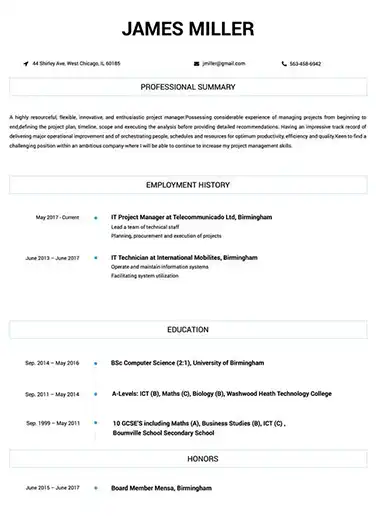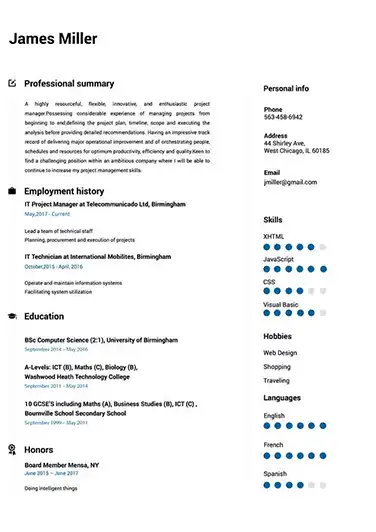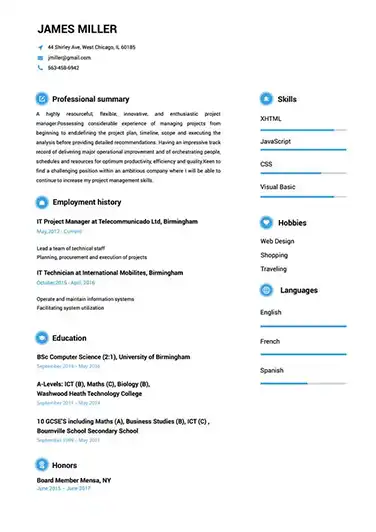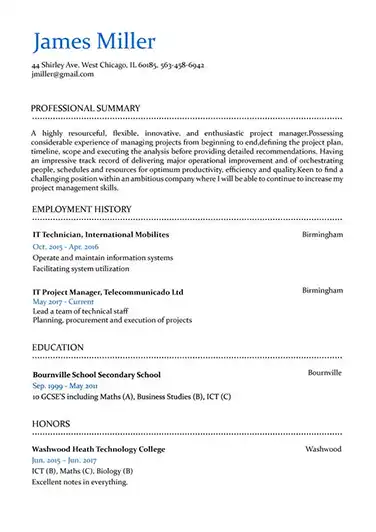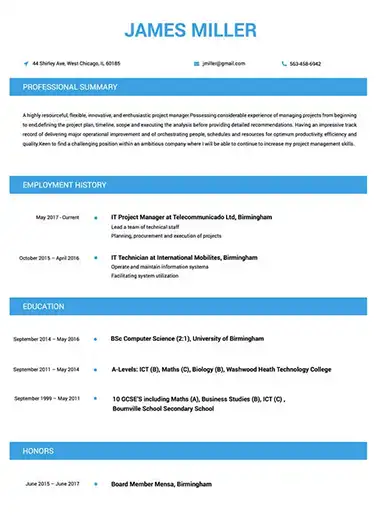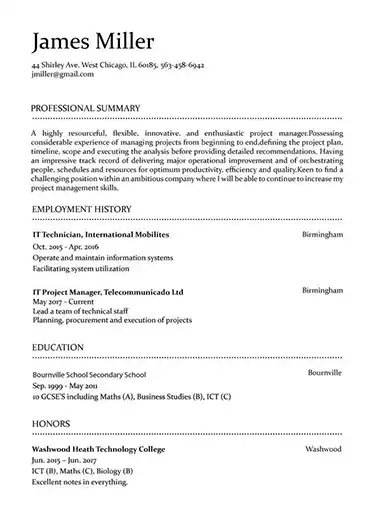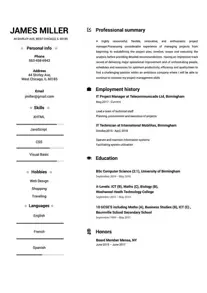 Use This Template
Use This Template
Build your resume in 15 minutes
Create an awesome resume that meets the expectations of potential employers with our selection of professional, field-tested resume templates.
financial advisor: Resume Samples & Writing Guide
kingvic96@yandex.com
987-794-0097
Professional Summary
Employment history
- Analyze financial data to identify and evaluate potential investments
- Recommend appropriate financial products and services
- Prepare financial reports and presentations for clients
- Recommend appropriate financial products and services
- Analyze financial data to identify and evaluate potential investments
- Prepare tax returns and other financial documents
- Recommend appropriate financial products and services
- Research and stay up-to-date on economic trends and financial markets
- Comply with all applicable laws, regulations, and industry standards
Education
Skills
Do you already have a resume? Use our PDF converter and edit your resume.
grayleonard@yahoo.com
760-777-8674
Professional Summary
Employment history
- Provide financial advice and guidance on investment strategies
- Educate clients on financial planning topics
- Negotiate with financial institutions on behalf of clients
- Provide financial advice and guidance on investment strategies
- Analyze financial data to identify and evaluate potential investments
- Recommend appropriate financial products and services
- Analyze financial data to identify and evaluate potential investments
- Research and stay up-to-date on economic trends and financial markets
- Develop and implement financial plans tailored to clients' needs
Education
Skills
cecilfoster1@outlook.com
960-922-0553
Professional Summary
Employment history
- Establish and maintain relationships with clients
- Comply with all applicable laws, regulations, and industry standards
- Provide advice and guidance on retirement planning
- Provide advice and guidance on retirement planning
- Prepare financial reports and presentations for clients
- Develop and implement financial plans tailored to clients' needs
- Monitor clients' investments and advise them on changes
- Develop and implement financial plans tailored to clients' needs
- Develop and manage client portfolios
Education
Skills
fredlewis@icloud.com
844-220-1901
Professional Summary
Employment history
- Provide financial advice and guidance on investment strategies
- Educate clients on financial planning topics
- Comply with all applicable laws, regulations, and industry standards
- Provide advice and guidance on retirement planning
- Develop and implement financial plans tailored to clients' needs
- Educate clients on financial planning topics
- Develop and manage client portfolios
- Develop and implement financial plans tailored to clients' needs
- Analyze clients' current and future financial needs
Education
Skills
fosterfloyd34@yahoo.com
729-227-4606
Employment history
- Prepare financial reports and presentations for clients
- Provide advice and guidance on retirement planning
- Research and stay up-to-date on economic trends and financial markets
- Develop and manage client portfolios
- Research and stay up-to-date on economic trends and financial markets
- Develop and implement financial plans tailored to clients' needs
- Recommend appropriate financial products and services
- Provide financial advice and guidance on investment strategies
- Develop and implement financial plans tailored to clients' needs
Education
Skills
Not in love with this template? Browse our full library of resume templates
American businessman and author Robert Kiyosaki once said, "It's not how much money you make, but how much money you keep, how hard it works for you, and how many generations you keep it for."
When it comes to making money work hard for you, there are few people more qualified to help you do that, than a financial advisor. After all, most people aren’t born with an inherent knowledge of how to effectively manage their finances. Consequently, those who are already struggling financially are vulnerable to falling into a cycle of debt. It is certainly sobering to think about the fact that household debt in the US alone has now topped $14 trillion.
A well-trained and experienced financial advisor has the expertise to help such people reconfigure their finances. They also have the know-how to guide people to make smart investment choices and other important financial decisions.
These are just a few of the reasons why the best financial advisors are worth their weight in gold. So how do you show recruiters that you’re one of them? Create a financial advisor resume that they can’t say no to. With the right formatting, words, and features, you’ll be able to establish yourself as a highly sought-after financial advisor.
We’ve compiled the following resume writing guide to provide you with the best insider tips for creating a strong resume. In it, we’ll answer all of the questions you have about putting together a winning resume including:
- What recruiters are actually looking for
- How to make a resume that passes the ATS (and what the ATS is)
- Which types of skills you should be targeting
- How to expertly match your resume to each job
- What tips experts recommend for making your resume shine
With the Bureau of Labor Statistics projecting that employment of personal financial advisors will grow 7 percent from 2018 to 2028, it’s a fantastic time to launch your job search. Be sure to set yourself up for success by following our expert guide.
1. Multiple Template Examples
2. How to Write a Financial Advisor Resume That Will Get Your Phone Ringing
How to format it
The format you choose for your resume may not seem like a decision that could impact the viability of your application. However, research has shown it is one of the most critical factors that influences how a recruiter views your resume. An eye-tracking study which pinpointed how recruiters read resumes found that they spent more time focusing on job titles, than on any other element in a resume.
This tells us two things:
- Recruiters are most interested in reading about your professional experiences.
- It’s beneficial to choose a format that positions your professional experiences prominently in your resume.
The format that is best at putting a spotlight on your professional experiences is the reverse-chronological format. In line with recruiters’ expectations, it features your most recent professional experience first and the ones that preceded it after.
The study also highlighted that recruiters have certain preferences when it comes to a resume’s layout, namely, “Clear, simple layouts with clearly marked section and title headers.” To ensure your resume reflects this, we suggest that you follow the layout rules we’ve outlined below:
- Number of Pages: 1 page at most.
- Fonts to Use: Only use professional fonts that are easy-to-read and will be processed by ATS, such as Georgia and Cambria.
- Fonts to Avoid: A good rule of thumb is to avoid fonts you wouldn’t use to write a financial report for a client, such as Caveat and Ultra.
- Margins: 1 inch on all sides.
- Line Spacing: 1 or 1.15.
- Header size: 14-16 point size.
- Text size: 11-12 point size.
What recruiters will look for
Each recruiter will have their own idea of the “x factor” that separates a good applicant for a financial advisor position from a great one. However, there are certain attributes that all recruiters will agree are absolutely essential for top candidates to possess.
Recruiters are essentially looking for financial advisors who have made a name for themselves for being naturals at what they do. Financial advisors who are looking to get hired should be skilled in providing their clients with reliable, trustworthy, thorough, and effective advice that supports them work towards their short and/or long-term financial goals. Recruiters are also looking for professionals who can equally contribute to the success of their company as a whole.
Needless to say, you will want to show a recruiter that you are the precise candidate they have in mind. Your resume is the key to doing this. When recruiters review it, they should see all of the attributes they’re looking for staring right back at them. You can discover our insider tricks about how to ensure your resume addresses recruiters’ criteria by reading each of the sections below.
How to get your resume past ATS
Impressing a recruiter with your resume is half the battle - you also need to get it past ATS. If you haven’t heard of ATS - prepare to be taken aback by the following information. ATS, which stands for Applicant Tracking Software, is a highly-advanced tool that millions of companies and HR professionals use to make the hiring process more efficient.
Instead of making a recruiter personally check over each resume one by one, resumes are fed through an ATS, which uses special algorithms to either instantly pass or reject a candidate. While the algorithm each company or recruiter sets on their ATS will differ, they generally program it to search for particular keywords on each resume. Resumes which feature the keywords will pass...while those that lack them will get rejected.
This means your resume could be rejected before it even gets read by a human! While it sounds like a sci-fi novel that the fate of your next job could be in the hands of a computer program, in reality, the use of ATS is surprisingly common. Research has found that more than 98% of Fortune 500 companies already use ATS. Moreover, an increasing number of SMBs are turning to ATS to streamline their recruitment process.
But before you get too disheartened, the good news is that you can easily get your resume past ATS by keeping a few things in mind. Here are the top ways to ensure your resume gets the tick of approval from an ATS:
- Use the right keywords: Incorporate keywords used in the job ad throughout your entire resume so that the ATS can detect them. Where possible, use the exact keywords found on the job ad rather than paraphrasing.
- Ensure your resume can be read and processed properly: Most ATS have difficulty reading and processing any “non standard” fonts, line spacing, borders, and colors. To be on the safe side, stick to the standard layout rules we shared above.
- Avoid using images, logos, or symbols: Another feature that most ATS struggle with is reading any graphics or symbols. This means that you should forget about including company logos, images, or symbols apart from bullet points.
- Don’t include any information in your resume’s header or footer: Most ATS are only designed to read and process the content found in the main part of a page. Consequently, any information you include in your resume’s header or footer is as good as invisible.
- Ensure your resume is free of typos: Typos on resumes are bad news all round, but if you’re lucky, a recruiter may not catch them. On the other hand, an ATS won’t be able to process a typo, which is particularly problematic if it is a keyword you’re trying to target. Avoid this faux pas by proofreading your resume until it’s 100% perfect.
Pro tip: Don’t be tempted to keyword stuff! While this technique may get you past the ATS, you need to remember that a recruiter will eventually read your resume as well. They won't be impressed with your attempts to game the system, so always ensure that the keywords sound natural and are written in context.
What skills to mention and how to do it correctly
To be a successful financial advisor, you need to constantly draw on an assortment of skills. You may not even realize how many skills you rely on to effectively carry out each task, because you now apply them like clockwork.
When you’re writing up your resume, you need to pinpoint which of your skills are most worthwhile to highlight for each job application. We have an insider trick that will help you get this right each and every time:
Instead of selecting skills that you think recruiters will find impressive, select the skills you know for a fact that they’re actively looking for.
You’re probably now wondering how you can manage such a feat without reading their minds. It’s much more logical than you think - all you need to do is scan the job ad carefully. You should identify any instances, where the recruiter mentions the skills that they’re after. Be sure to keep your eyes peeled for both soft and hard skills. We’ll explain the difference between these skills as well as some helpful examples of each below:
Soft skills
What are they? Intangible skills that relate to a candidate’s interpersonal or communication abilities.
Examples:
- Problem solving
- Empathy
- Ability to handle stress
- Analytical
- Work ethic
- Time management
- Adaptability
- Confidence
- Sense of ethics
Hard skills
What are they? Tangible, technical skills that are often specific to your particular line of work or the finance industry.
Examples:
- Analyzing financial data
- Accounting skills
- Updating client portfolios
- Advising financial strategies
- Developing a client base
- Recommending services and investments
- Scrutinising investments
- Generating client enquiries
- Maintaining high level compliance standards
- Identifying opportunities for financial seminars
To include your skills on your resume, list 6 to 8 in a dedicated “Skills” section. You can also highlight 1 to 2 relevant ones in your resume objective or resume summary. If you’re really wanting to impress, try to incorporate one in each of your job achievements as well!
How to list your education correctly
Clients are rightly cautious about working with just any old financial advisor. After all, it’s their entire livelihoods at stake - so it makes sense that they are looking to get advice from a financial advisor, who has a deep theoretical knowledge and understanding to back up what they’re saying.
It’s for this reason that recruiters value candidates, who have an impressive educational background. Recruiters know that their companies’ clients will seek well-educated financial advisors, so it’s practical to hire someone who already offers one from the get-go.
At minimum, the majority of financial advisor jobs require candidates to have a bachelor’s degree from an accredited educational institution. Ideally, your major should be in a field that is directly relevant to the profession, such as finance, business, statistics, or even marketing. If you’re applying for a more prestigious firm or a higher up position, you may be required to also have a relevant graduate degree or a Master's in Business Administration (MBA).
In order to correctly include details about your educational background on your resume, you should include them under a section called “Education”. When putting together this section, don’t make the mistake of writing about your degree/s in sentence case, like this candidate did:
Education
I hold a Bachelor of Business Administration with a major in finance from the Bauer College of Business, University of Houston. I graduated in 2016 with a GPA of 3.5.
This reads more like the start of a resume objective (which we discuss further below), rather than being part of an education section. You only need to provide key details about each degree you have, with the order you list them dependent on the resume format you use.
Below, we’ve listed the key details you should include:
- Name of Degree (use an acronym of the degree to save space)
- Major
- Name of the college or educational institution
- State the college is located in
- Graduation year
- GPA (only include if more than 3.5)
Applying this rule to our candidate above, their experience section should instead look like this:
Education
BBA in Finance
Bauer College of Business
University of Houston, TX
2016
3.5 GPA
Pro tip: If you plan on becoming a certified financial planner (CFP), you must complete college or university-level coursework through a CFP Board Registered Program.
Why additional certifications are especially important for this role and how to list them correctly
While including certifications on a resume is considered to be a “nice to have” feature in many professions, it is vital to include them on financial advisor resumes. Financial advisors need to demonstrate that they have undergone the required training to provide their clients with fair and effective advice.
The most important certification that you should feature on your resume is your Certified Financial Planner (CFP) certification. As Investopedia explains, “Unlike some certificates that are worth little more than the paper they’re printed on, the CFP designation is one of the most prestigious financial certificates around.”
This certification shows recruiters that you are a high caliber financial advisor, who has the knowledge, skills, and training to provide clients with world-class financial advice. Moreover, many clients are only willing to work with a financial advisor, who is a CPF, so most recruiters will give strong preference to those, who are already one.
To include your CPF certification on your resume, you can state it right next to your name. For example:
Marianne Mayer (CPF)
You should also include details of your CPF in a dedicated “Certifications” section, using the following format:
Certifications
[Name of the certification], [Institution that issued the certification], [State (if applicable)], [Year you received the certification]
You can also use the above format to include any other additional certifications that are relevant to your profession. Including them will help to further demonstrate your commitment to your professional learning and development.
Pro tip: You should strive to consistently add new certifications to your arsenal to ensure you’re always growing as a professional. A recruiter will be markedly more impressed by a candidate who regularly completes relevant certifications than one whose last certification was many years ago.
How to write a resume objective or summary and examples of both
Every financial advisor resume should either feature a resume objective or resume summary section. Your level of experience will determine which one is optimal for your resume. Whichever you use, make sure to position it under your name and contact details, and keep it to 2 to 4 sentences.
Resume Objective
A resume objective gives entry-level candidates with little to no experience the chance to tell recruiters why they’re a top notch candidate. When writing your resume objective, aim to make the recruiter put aside your relative inexperience and focus on the many draw cards you offer instead.
You should ensure it features information about yourself, which is as relevant as possible to the position you’re applying to. In order to do this, highlight your relevant educational background, skills, and career aspirations. You should also mention relevant work, internship, or volunteer experiences, if you have any.
Be mindful to avoid writing in a way which emphasizes your weaknesses or highlights your lack of confidence in your own abilities, like this candidate did:
I dream about being a financial advisor, but I don’t have any work experience yet. If you would be kind enough to give me a chance and hire me as an intern, I think that I would be a great help to your company.
Instead, focus your efforts on convincing the recruiter that your strengths would make you an asset to their company. Be confident in highlighting the relevant attributes you can offer, despite your lack of work experience. We’ve revised the above resume objective to show you what a difference changing your perspective makes:
Aspiring financial advisor and final year Bachelor of Science student, with a major in statistics at the University of Iowa (GPA 3.6), is seeking an entry-level financial advisor position at Purple Horizon Financial Consulting. I endeavor to bring my superior data analysis skills, ability to stay calm under pressure, and friendly demeanor to each task.
Resume Summary
In the finance industry, money talks. That’s why it’s vital that your resume summary positions you as a candidate who has what it takes to expertly advise clients about their financial matters as well as generate more revenue for the company itself.
You should ensure you don’t focus on what you can do for the company, as opposed to what you can do for the company, like this resume summary does:
Certified financial advisor with 4 years of experience who wants to work at Constellation Accounting so I can further develop the many skills I already have. Constellation would be lucky to hire such a one-of-a-kind candidate like me.
A recruiter would definitely not be impressed by this candidate! They fail to explain why they’re even worth considering, let alone that they use an unprofessional tone.
To make a resume summary that recruiters will actually look forward to reading, hone in on the relevant skills, experiences, education and training you can use to help the company reach its objectives. We’ve rewritten the above resume objective to show this in action:
Certified financial advisor with 4 years of experience, who endeavors to leverage my proven skills in client acquisition and portfolio analysis, in order to strengthen Constellation Accounting’s year-on-year growth. Along with my second-to-none work ethic, I bring along meticulous organizational and problem solving skills to each task.
How to target your resume for each application, including how to list only relevant skills and achievements for that specific company & position
In order to guarantee a recruiter doesn’t bypass your resume, you will need to target it to address the specific criteria a recruiter is looking for. The two sections you will need to be particularly mindful to do so are your skills and achievements sections.
The key to targeting your resume for each application is to modify your resume each time, so it matches a recruiter’s vision of their ideal candidate as closely as possible. The primary means of doing this is to naturally incorporate relevant keywords from a job ad into your resume. You can easily identify keywords by scanning a job ad and looking for nouns related to the main skills as well as competencies a job is calling for.
Once you have a list of the keywords used in a job ad, you will then need to work on naturally weaving them throughout your resume. For example, if the job ad contains the keywords “quality strategic advice,” you should provide an example, which highlights the impact your quality strategic advice had on a client in your job achievements section.
How to make your resume stand out
There’s no way around it; you need to make your resume stand out so it not only competes against other applicants’ resumes, but is also ultimately chosen over them.
If you’re diligent with following our guide above, you’ll be able to make a resume that is superior to the resumes of most other applicants. But to really differentiate it, you need to go a few steps further. Here are our expert tips to help you do this:
- Quantify your achievements: Make your achievements more eye-catching by quantifying them using numbers and percentages. For example, “Helped a client reduce their debt by 60% in 3 months.”
- Highlight how much your clients love working with you: Recruiters want to know that in addition to your razor-sharp financial skills, clients actually like working with you. If you have access to them, it’s always helpful to include your client satisfaction rates.
- Don’t be shy about including your awards: Did you win the “Financial Advisor of the Year” award in your company? Or have you or your team won an award in the industry? Be sure to mention it in your resume summary in a separate “Awards” section.
- Get a second set of eyes to read over your resume: Ask your mentor or trusted friend or family member to read over your resume in order to offer constructive feedback and pick up on any typos and grammatical errors.
3. How Resumebuild.com’s Resume Builder Tool Can Be Utilized for an Easy Resume Setup
We’ve now shared all of our insider tips for making a stunning financial advisor resume. The good news is that it’s possible for just about anyone to do so. The bad news is that it’s no walk in the park. You’ll need to set aside hours - if not days - to write, edit, format, and proofread your resume until it’s just right.
Beyond being draining to work on it when you have a million other things on your mind, it is also difficult to schedule the time to do so. Then there’s also the financial cost of endlessly working on your resume - every minute you spend on it is one less minute of possible income. It doesn’t take a financial advisor to realize that’s not economically sound!
That’s why it’s a wise idea to outsource the task of making your resume. However, we’re not talking about hiring a professional resume writer, who can charge an exorbitant fee of upwards of $100.
We’re talking about using an innovative piece of software called a resume builder. High-quality options like Resumebuild.com’s resume builder tool allow jobseekers like yourself to quickly, easily, and affordably create an industry-specific professional resume that’s targeted for each application. Resumebuild’s resume builder will walk you step-by-step through how to expertly complete each section of your resume.
We’ve even sorted out the layout of your resume, thanks to the assortment of stunning, HR-friendly resume templates we’ve created for you to choose from. As an added bonus, we’ve made filling out the trickier sections of your resume a breeze by providing eye-catching pre-written examples for you to use.
In the end, you’ll be able to woo recruiters with a brand new financial advisor resume that not only addresses what they’re looking for, but also properly honors your professional accomplishments. Ready to begin? You can start making your resume in just minutes!
financial advisor Job Descriptions; Explained
If you're applying for an financial advisor position, it's important to tailor your resume to the specific job requirements in order to differentiate yourself from other candidates. Including accurate and relevant information that directly aligns with the job description can greatly increase your chances of securing an interview with potential employers.
When crafting your resume, be sure to use action verbs and a clear, concise format to highlight your relevant skills and experience. Remember, the job description is your first opportunity to make an impression on recruiters, so pay close attention to the details and make sure you're presenting yourself in the best possible light.
financial advisor
- Business Development against set targets (Focus on fund base targets).
- To check and verify various documents of customers as per norms.
- To build, manage and strengthen existing relationships, by regular meeting to understand their changing needs and demand for better product & service delivery.
- Interacting with clients to assess their financial situations and develop strategic financial planning solutions.
- Monitoring after sales service to existing clients as well as new clients.
- Organizing of leads generation activities from Various Location.
financial advisor
- Organize and distribute client files.
- Filled out paperwork and categorized documents.
- Assisted advisor on a daily agenda.
- Delegated tasks with another assistant.
- Communicated with clients in emails and letters.
financial advisor
- Customize the portfolio for the clients as per their financial needs.
- Handle the client’s queries related mutual funds and advice them in achieving their financial goals.
- Answer customer questions regarding problems with their investments and financial queries.
- Examine and evaluate financial and information systems, recommending mutual funds for fulfilling client’s goals.
senior financial advisor
- Determine customer needs
- Evaluate degree of financial risk, compute financial data
- Sell insurance policies
- Use interpersonal communication techniques
- Make a group presentation, motivate people.
financial advisor
- Interviewed prospective clients to obtain data about their financial resources and needs
- Presented company products to clients and prospects
- Sold life assurance and unit trust products
- Advised clients on diverse financial and insurance products
- Managed client portfolios
- Led a team of advisor in a campaign the yielded exceptional results
financial advisor Job Skills
For an financial advisor position, your job skills are a key factor in demonstrating your value to the company and showing recruiters that you're the ight fit for the role. It's important to be specific when highlighting your skills and ensure that they are directly aligned with the job requirements, as this can greatly improve your chances of being hired. By showcasing your relevant skills and experience, you can make a compelling case for why you're the best candidate for the job.
How to include technical skills in your resume:
Technical skills are a set of specialized abilities and knowledge required to perform a particular job
effectively. Some examples of technical skills are data analysis, project management, software proficiency,
and programming languages, to name a few.
Add the technical skills that will get hired in your career
field with our simple-to-use resume builder. Select your desired resume template, once you reach the skills
section of the builder, manually write in the skill or simply click on "Add more skills". This will
automatically generate the best skills for your career field, choose your skill level, and hit "Save &
Next."
- Financial Analysis
- Asset Allocation
- Regulatory Compliance
- Tax Planning
- Investment Strategies
- Portfolio Management
- Wealth Management
- Retirement Planning
- Risk Management
- Cash Flow Management
- Financial Modeling
- Financial Statement Analysis
- Estate Planning
- Insurance Planning
- Equity Analysis
- Derivatives Trading
- Financial Reporting
- Capital Markets
- Hedge Fund Analysis
- Credit Analysis
- Mergers and Acquisitions.
How to include soft skills in your resume:
Soft skills are non-technical skills that relate to how you work and that can be used in any job. Including
soft skills such as time management, creative thinking, teamwork, and conflict resolution demonstrate your
problem-solving abilities and show that you navigate challenges and changes in the workplace
efficiently.
Add competitive soft skills to make your resume stand-out to recruiters! Simply select
your preferred resume template in the skills section, enter the skills manually or use the "Add more skills"
option. Our resume builder will generate the most relevant soft skills for your career path. Choose your
proficiency level for each skill, and then click "Save & Next" to proceed to the next section.
- Communication
- Interpersonal
- Leadership
- Time Management
- Problem Solving
- Decision Making
- Critical Thinking
- Creativity
- Adaptability
- Teamwork
- Organization
- Planning
- Public Speaking
- Negotiation
- Conflict Resolution
- Research
- Analytical
- Attention to Detail
- Self-Motivation
- Stress Management
- Collaboration
- Coaching
- Mentoring
- Listening
- Networking
- Strategic Thinking
- Negotiation
- Emotional Intelligence
- Adaptability
- Flexibility
- Reliability
- Professionalism
- Computer Literacy
- Technical
- Data Analysis
- Project Management
- Customer Service
- Presentation
- Written Communication
- Social Media
- Troubleshooting
- Quality Assurance
- Collaboration
- Supervisory
- Risk Management
- Database Management
- Training
- Innovation
- Documentation
- Accounting
- Financial Management
- Visualization
- Reporting
- Business Acumen
- Process Improvement
- Documentation
- Relationship Management.
How to Improve Your financial advisor Resume
Navigating resume pitfalls can mean the difference between landing an interview or not. Missing job descriptions or unexplained work history gaps can cause recruiters to hesitate. Let's not even talk about the impact of bad grammar, and forgetting your contact info could leave your potential employer hanging. Aim to be comprehensive, concise, and accurate.
austinfrancis63@icloud.com
952-524-1806
Employment history
- Establish and maintain relationships with clients
- Negotiate with financial institutions on behalf of clients
- Analyze clients' current and future financial needs
- Prepare financial reports and presentations for clients
- Establish and maintain relationships with clients
- Recommend appropriate financial products and services
Education
Skills
Unexplained Year Gaps and Missing Job Experiences are a No-no
Gaps in your resume can prevent recruiters from hiring you if you don't explain them.
Key Insights- It's okay to have gaps in your work experience but always offer a valid explanation instead of just hiding it.
- Use the gap to talk about positive attributes or additional skills you've learned.
- Be honest and straightforward about the gap and explain it using a professional summary.
How to Optimize Your financial advisor Resume
Keep an eye out for these resume traps. Neglecting to detail your job roles or explain gaps in your career can lead to unnecessary doubts. Grammar blunders can reflect negatively on you, and without contact information, how can employers reach you? Be meticulous and complete.
Employment history
- Moniter client's invesments, and advize them on changes.
- Develp and mange clint portfollios.
- Prepear tax returns an othr financal documnets.
- Establishd annd maintainn relationshipss withh clientts.
- Devellop and managee clientt portfolioss.
- Devlop and implemet finacial plans taylored too clients needs.
- Preppare finacial report's and presentation's fer client's.
- Eduacte clients on finacial plannin topics.
- Provide financail adviece and guidence on invesment stratigies.
Education
Skills
Avoid Spelling Mistakes and Include your Contact Information
Missing contact information prevents recruiters from understanding you're the best fit for the position.
Key Insights- Make sure you're not missing contact information on your resume. That should include your full name, telephone number and email address.
- Make sure to use a professional email address as part of your contact information.
- Highlight your contact information and double check that everything is accurate to help recruiters get in touch with you.
financial advisor Cover Letter Example
A cover letter can be a valuable addition to your job application when applying for an financial advisor position. Cover letters provide a concise summary of your qualifications, skills, and experience, also it also gives you an opportunity to explain why you're the best fit for the job. Crafting a cover letter that showcases your relevant experience and enthusiasm for the Accounts Payable role can significantly improve your chances of securing an interview.
King kingvic96@yandex.com
987-794-0097
393 Cypress Avenue, Prairie Hill, MO
65281
JP Morgan Chase
New York, New York
To Whom It May Concern
I am writing to express my interest in the Lead Financial Advisor role at JP Morgan Chase. As a Financial Advisor with 12 years of experience, I am confident that I possess the necessary skills and qualifications to excel in this position.
As someone who has faced challenges in various areas of my life and has overcome them, I am confident in my ability to adapt and thrive in any environment. I have developed a reputation for being a collaborative team player and an effective problem solver, which has been instrumental in my career's success. With my experience and passion for Financial Services, I am excited to apply my skills to this role and contribute to your organization's growth and success.
Thank you for considering my application for the Lead Financial Advisor role at your organization. I am dedicated to continuous improvement, and elated about the opportunity to join your team and work towards achieving our shared goals together.
Sincerely,
Vic King
987-794-0097
kingvic96@yandex.com
Vic King
Showcase your most significant accomplishments and qualifications with this cover
letter.
Personalize this cover letter in just few minutes with our user-friendly tool!
Related Resumes & Cover Letters

Build your Resume in 15 minutes
Create an awesome resume that meets the expectations of potential employers with our selection of professional, field-tested resume templates.

